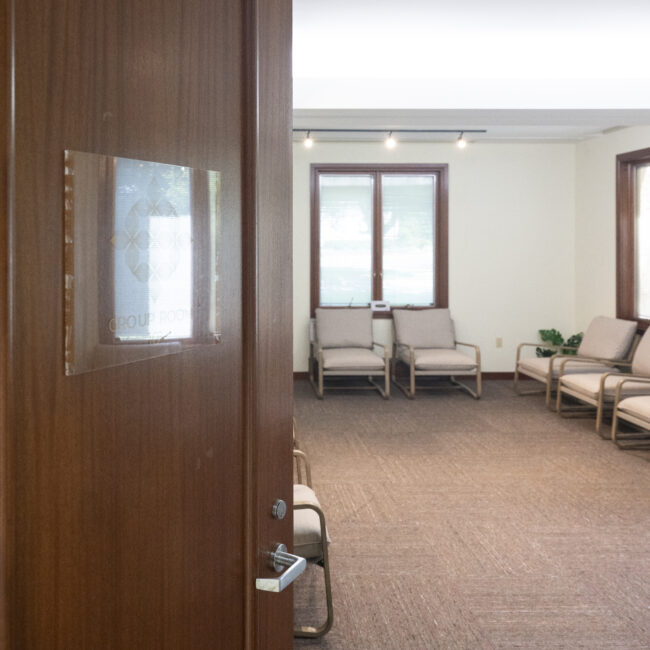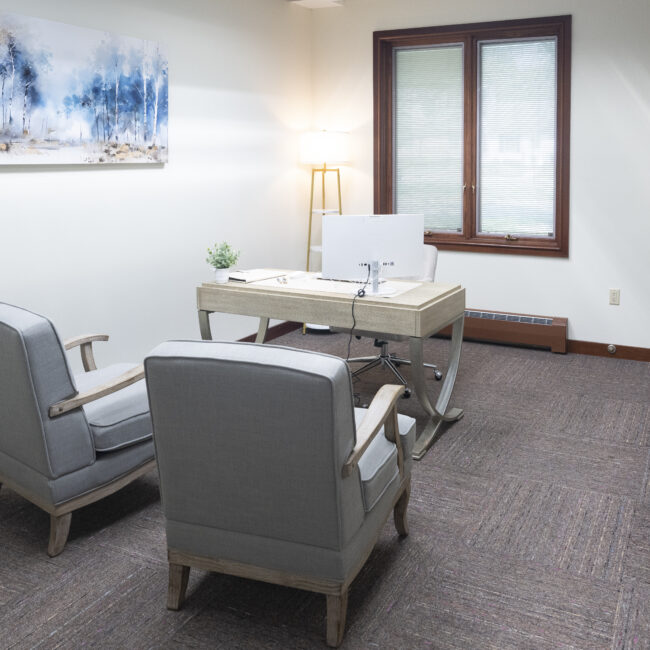-
TMS Treatment Center in New Jersey
TMS Therapy
- Stone River Behavioral Health
- What We Treat
- TMS Therapy
If you or a loved on is in need of TMS therapy in New Jersey, look no further than Stone River Behavioral Health.
TMS therapy Treatment in NJ
TMS Therapy in New Jersey
Mental health challenges, including depression, anxiety, and dual-diagnosis disorders, profoundly impact individuals’ daily lives and overall well-being. When these conditions co-occur, known as dual diagnosis, they present additional complexities that necessitate comprehensive and integrated treatment approaches.
At Stone River Behavioral Health in Holmdel, New Jersey, we are dedicated to providing personalized care for individuals facing these challenges. Our mission is to empower those struggling with mental health conditions, promote sustainable recovery, and redefine behavioral health. One of the advanced therapies we offer is Transcranial Magnetic Stimulation (TMS), an innovative, noninvasive treatment designed to effectively address various mental health conditions.
As more individuals seek effective and minimally invasive mental health treatment in New Jersey, TMS continues to grow in popularity. Many clients come to us after years of trying medication, therapy, or inpatient programs with limited results. TMS provides a new pathway forward—one that works with the brain’s natural processes to reset and restore mental balance. Stone River offers this cutting-edge therapy within a compassionate, individualized care setting.
- What Does tms Therapy Look Like?
What Is TMS Therapy?
Transcranial Magnetic Stimulation (TMS) is a non-invasive procedure that utilizes magnetic fields to stimulate nerve cells in specific regions of the brain associated with mood regulation. Approved by the U.S. Food and Drug Administration (FDA), TMS is primarily used to treat major depressive disorder, particularly in individuals who have not responded to traditional treatments such as medication and psychotherapy.
An electromagnetic coil is placed against the patient’s scalp near the forehead during a TMS session. The device generates magnetic pulses that pass through the skull and induce electrical currents in targeted brain areas. These currents stimulate nerve cells, potentially improving mood and alleviating depressive symptoms. A typical TMS treatment course involves daily sessions over several weeks, each lasting approximately 30 to 60 minutes.
Clients often describe the sensation during treatment as tapping or clicking near the scalp, which becomes more comfortable over time. Many individuals experience noticeable improvements after just a few weeks, with continuing progress throughout the treatment schedule. Since no anesthesia or sedation is involved, clients can return to work, school, or personal responsibilities right after their sessions.
Who Is Right for TMS Therapy?
TMS therapy may be suitable for individuals experiencing a wide range of mental health challenges, particularly when traditional methods have not led to improvement:
Those who have not found relief from depressive symptoms despite trying multiple antidepressant medications or psychotherapy. TMS provides a fresh, science-backed alternative for individuals seeking symptom relief without medication. It can help re-engage the brain’s natural ability to regulate mood, offering hope where other treatments have fallen short.
Individuals who cannot tolerate the side effects associated with antidepressant medications. For many, TMS presents a well-tolerated option that avoids the systemic impact of pharmaceuticals. This makes it appealing for those prioritizing long-term wellness without compromising their daily functioning.
Patients are interested in alternative treatments that do not involve surgery or systemic medication. TMS offers a safe and comfortable experience, without hospitalization or sedation. Its non-invasive nature allows individuals to return to their daily routines immediately after each session.
While TMS is primarily used for depression, studies have shown it can also benefit those with anxiety and panic disorders. It works by regulating brain activity related to mood and emotional regulation. Many patients report a noticeable reduction in anxious thoughts and physical symptoms over time.
TMS can be helpful for individuals managing both a mental health disorder and a substance use disorder. Reducing depressive symptoms can improve focus and motivation for recovery in dual diagnosis cases. This integrated benefit supports a more balanced and sustainable healing process.
For some individuals with trauma-related symptoms, TMS may support recovery by reducing hypervigilance, mood swings, and emotional dysregulation. When used alongside trauma therapy, it can enhance resilience and psychological stability. This combined approach may lead to a deeper and more lasting emotional recovery.
A comprehensive evaluation by our Stone River Behavioral Health clinical team will determine if TMS therapy aligns with your specific needs and treatment goals. We’ll assess your medical and mental health history to create a personalized plan that addresses your whole-person wellness.
- What We Offer
Our Treatment Services
- 100% Confidential Support
Request a Confidential Callback
- TMS therapy at Stone River Behavioral Health
Benefits of TMS Therapy for Mental Health and Dual Diagnosis Conditions
Non-Invasive and Well-Tolerated
TMS does not require anesthesia or sedation; patients can resume daily activities immediately after each session. The most common side effect is mild scalp discomfort or headache during or after treatment, making it a convenient option for many individuals.
Efficacy in Treatment-Resistant Cases
Clinical studies have demonstrated that TMS can significantly reduce depressive symptoms in individuals who have not responded to traditional treatments. This makes it a promising option for those who feel they’ve exhausted other therapeutic avenues and seek new hope.
Potential Benefits for Co-Occurring Disorders
Emerging research suggests that TMS may also be effective in addressing symptoms of anxiety and certain substance use disorders. By treating underlying mood disturbances, TMS can indirectly support long-term recovery from addiction and strengthen other areas of treatment.
Improved Cognitive Function
Some individuals report improved cognitive clarity and focus following a course of TMS treatment. This can be particularly helpful for those who struggle with concentration issues related to depression or anxiety, improving daily functioning and quality of life.
Minimal Long-Term Side Effects
Unlike many pharmacological treatments, TMS is not associated with long-term systemic side effects. This makes it a safe, sustainable treatment option for ongoing mental health maintenance and relapse prevention.
Enhanced Motivation and Energy Levels
TMS has been linked to improved motivation and increased energy, which can be vital for individuals coping with depression. This boost can support participation in therapy, physical activity, and social connection.
Complements Existing Therapies
TMS can enhance the effectiveness of other treatments, such as psychotherapy or medication. When part of a comprehensive care plan, it often accelerates progress and improves overall treatment outcomes.
- How We Approach TMS therapy
Integrating TMS into Your Treatment Plan
Our clinical team thoroughly evaluates your mental health history, current symptoms, and treatment experiences to determine if TMS is appropriate for you. This initial step ensures we understand your unique needs and helps us identify the most beneficial therapeutic options.
If TMS is deemed suitable, we work with you to develop a tailored treatment plan that may combine TMS with other therapeutic modalities such as psychotherapy, medication management, and lifestyle interventions. We believe in a team approach, keeping your personal goals at the center of every treatment decision.
Throughout the TMS treatment course, we closely monitor your progress, adjust the treatment plan as needed, and provide continuous support to ensure optimal outcomes. Regular evaluations and therapist feedback sessions help ensure that therapy is effective and aligned with your progress.
TMS therapy is most effective when incorporated into a well-rounded recovery program. We integrate TMS alongside other treatments, such as CBT, DBT, or EMDR, to enhance therapeutic outcomes and address recovery’s biological and psychological components.
We educate clients on TMS and what to expect from the treatment process. Empowering clients with knowledge increases confidence and engagement in treatment, which is crucial for achieving long-term results.
- Stories of Healing
Client Testimonials

Sarah M.
"Seeking mental health support was a huge step for me, and Stone River Behavioral Health made the journey less daunting. Their approach to treatment is personalized, and they took the time to understand my unique struggle with anxiety. I can confidently say my quality of life has improved immensely since starting with them."

David G.
"I was battling severe depression when I first walked into Stone River Behavioral Health — they literally saved my life. The team was incredibly supportive from day one, providing me with the tools and strategies to navigate through my darkest moments. Today, I'm able to lead a life that once seemed unattainable. Thank you, Stone River!""

Lisa T.
"Stone River Behavioral Health has been an absolute game-changer for our family. Their compassionate and skilled team helped my son manage his schizophrenia symptoms effectively, giving him hope and us peace of mind. They didn't only treat him but also involved us in the process to better understand and support him. We're forever grateful."

Rebecca F.
"I've struggled with PTSD for years, but the team at Stone River Behavioral Health has made a difference like no other. Their trauma-based therapies and supportive environment have helped me reclaim my life from the shadows of traumatic experiences. It's not just about managing symptoms, it's about healing. At Stone River, I felt heard, cared for, and, most importantly, hopeful. Highly recommended!"
Depression
Characterized by persistent feelings of sadness, hopelessness, and a lack of interest in activities once enjoyed. Depression can affect one’s daily life and require interventions like therapy and medication.
Anixety Disorders
These include generalized anxiety disorder, panic disorder, and social anxiety disorder. Individuals may experience excessive worry, panic attacks, and intense discomfort in social situations.
Bipolar Disorder
Marked by extreme mood swings that include emotional highs (mania or hypomania) and lows (depression).
Trauma & PTSD
Develops after experiencing or witnessing a traumatic event. PTSD can cause severe anxiety, flashbacks, and uncontrollable thoughts about the event.
Obsessive-Compulsive
Involves unwanted, intrusive thoughts (obsessions) and repetitive behaviors (compulsions) that individuals feel driven to perform.
Substance Use
Chronic use of substances like drugs and alcohol that leads to significant impairment and distress. This includes those with co-occurring, dual-diagnosis substance use and mental health conditions.
- Start Your Journey Now
Take the First Step Toward Healing
If you or a loved one is struggling with depression, anxiety, or a dual diagnosis condition, Stone River Behavioral Health is here to help. Our TMS therapy program in Holmdel, NJ, offers a non-invasive, effective path to recovery. Whether you’re seeking relief after years of battling mental illness or looking to enhance your existing treatment, we are here to guide you every step of the way.
Don’t let untreated mental health challenges hold you back any longer. Contact our admissions team today to learn more about our services and take the first step toward a healthier, more fulfilling life.
At Stone River Behavioral Health, your mental health matters.


























